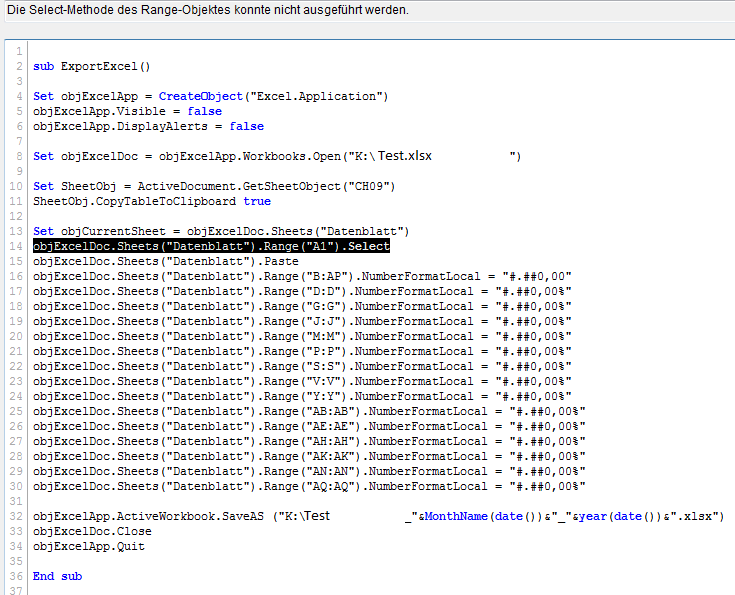Unlock a world of possibilities! Login now and discover the exclusive benefits awaiting you.
- Qlik Community
- :
- All Forums
- :
- QlikView App Dev
- :
- Select-method not working in macro
- Subscribe to RSS Feed
- Mark Topic as New
- Mark Topic as Read
- Float this Topic for Current User
- Bookmark
- Subscribe
- Mute
- Printer Friendly Page
- Mark as New
- Bookmark
- Subscribe
- Mute
- Subscribe to RSS Feed
- Permalink
- Report Inappropriate Content
Select-method not working in macro
Hi everybody,
I have a problem again. On Friday I prepare a macro where I open an exsisted excel file, drop a table on a sheet and close the file while saving with another name. It has worked.
Than I reload the script on saturday, but nothing is happend ![]() Now the script shows me the error "select-method of the range-object could not be implenemt".
Now the script shows me the error "select-method of the range-object could not be implenemt".

If I worte for the range cell, could the object not be suported. What's wrong with the code?
Regards Vicky
- « Previous Replies
-
- 1
- 2
- Next Replies »
Accepted Solutions
- Mark as New
- Bookmark
- Subscribe
- Mute
- Subscribe to RSS Feed
- Permalink
- Report Inappropriate Content
as i see you can add one extra line
Set objCurrentSheet = objExcelDoc.Sheets("Datenblatt")
objExcelDoc.Sheets("Datenblatt").Select
objExcelDoc.Sheets("Datenblatt").Range("A1").Select
this should help you
- Mark as New
- Bookmark
- Subscribe
- Mute
- Subscribe to RSS Feed
- Permalink
- Report Inappropriate Content
could you paste ExportExel macro code here?
- Mark as New
- Bookmark
- Subscribe
- Mute
- Subscribe to RSS Feed
- Permalink
- Report Inappropriate Content
Here you are,
sub ExportExcel()
Set objExcelApp = CreateObject("Excel.Application")
objExcelApp.Visible = false
objExcelApp.DisplayAlerts = false
Set objExcelDoc = objExcelApp.Workbooks.Open("K:\Test.xlsx")
Set SheetObj = ActiveDocument.GetSheetObject("CH09")
SheetObj.CopyTableToClipboard true
Set objCurrentSheet = objExcelDoc.Sheets("Datenblatt")
objExcelDoc.Sheets("Datenblatt").Range("A1").Select
objExcelDoc.Sheets("Datenblatt").Paste
objExcelDoc.Sheets("Datenblatt").Range("B:AP").NumberFormatLocal = "#.##0,00"
objExcelDoc.Sheets("Datenblatt").Range("D:D").NumberFormatLocal = "#.##0,00%"
objExcelDoc.Sheets("Datenblatt").Range("G:G").NumberFormatLocal = "#.##0,00%"
objExcelDoc.Sheets("Datenblatt").Range("J:J").NumberFormatLocal = "#.##0,00%"
objExcelDoc.Sheets("Datenblatt").Range("M:M").NumberFormatLocal = "#.##0,00%"
objExcelDoc.Sheets("Datenblatt").Range("P:P").NumberFormatLocal = "#.##0,00%"
objExcelDoc.Sheets("Datenblatt").Range("S:S").NumberFormatLocal = "#.##0,00%"
objExcelDoc.Sheets("Datenblatt").Range("V:V").NumberFormatLocal = "#.##0,00%"
objExcelDoc.Sheets("Datenblatt").Range("Y:Y").NumberFormatLocal = "#.##0,00%"
objExcelDoc.Sheets("Datenblatt").Range("AB:AB").NumberFormatLocal = "#.##0,00%"
objExcelDoc.Sheets("Datenblatt").Range("AE:AE").NumberFormatLocal = "#.##0,00%"
objExcelDoc.Sheets("Datenblatt").Range("AH:AH").NumberFormatLocal = "#.##0,00%"
objExcelDoc.Sheets("Datenblatt").Range("AK:AK").NumberFormatLocal = "#.##0,00%"
objExcelDoc.Sheets("Datenblatt").Range("AN:AN").NumberFormatLocal = "#.##0,00%"
objExcelDoc.Sheets("Datenblatt").Range("AQ:AQ").NumberFormatLocal = "#.##0,00%"
objExcelApp.ActiveWorkbook.SaveAS ("K:\Test_"&MonthName(date())&"_"&year(date())&".xlsx")
objExcelDoc.Close
objExcelApp.Quit
End sub
- Mark as New
- Bookmark
- Subscribe
- Mute
- Subscribe to RSS Feed
- Permalink
- Report Inappropriate Content
Just a question, how is the macro triggered?
- Mark as New
- Bookmark
- Subscribe
- Mute
- Subscribe to RSS Feed
- Permalink
- Report Inappropriate Content
Hi,
with a trigger in the document setting.
The first choose (during script execution) -> start macro.
The QV-File does triggered with the task scheduler from mircosoft.
- Mark as New
- Bookmark
- Subscribe
- Mute
- Subscribe to RSS Feed
- Permalink
- Report Inappropriate Content
Ok, so if I understand correctly then you are not using QV-server or Publisher to reload the .qvw?
And, what version of QV are you using (just another check)?
- Mark as New
- Bookmark
- Subscribe
- Mute
- Subscribe to RSS Feed
- Permalink
- Report Inappropriate Content
No, I'm not using QV-Server or Publisher. I only have single-user licence at the moment.
The version is 11.00.11154.0
- Mark as New
- Bookmark
- Subscribe
- Mute
- Subscribe to RSS Feed
- Permalink
- Report Inappropriate Content
Hi Vicky,
If you try to open the Test.xlsx document does it report the file is locked for editing? Also check Task Manager for any running Excel applications.
You will need add set objExcelApp = Nothing to the last line of your code to release the Excel object to prevent this.
Hope this works
flipside
- Mark as New
- Bookmark
- Subscribe
- Mute
- Subscribe to RSS Feed
- Permalink
- Report Inappropriate Content
This is not solving my problem. ![]() If I set objExcelApp.Visible = true and comment the with the objExcelDoc-part out, the excel file will be opened and save with the different name as desired. there is also no runny excel application in task manager. All is fine, but with the objExcelDoc-part nothing happens.
If I set objExcelApp.Visible = true and comment the with the objExcelDoc-part out, the excel file will be opened and save with the different name as desired. there is also no runny excel application in task manager. All is fine, but with the objExcelDoc-part nothing happens. ![]()
- Mark as New
- Bookmark
- Subscribe
- Mute
- Subscribe to RSS Feed
- Permalink
- Report Inappropriate Content
does your K:\Test.xlsx file contain only plain text? or images to?
check if there are no merged cells
- « Previous Replies
-
- 1
- 2
- Next Replies »